Presentation and Discussion Summary
November 16, 2012 at U Thant International Conference Hall, United Nations University.
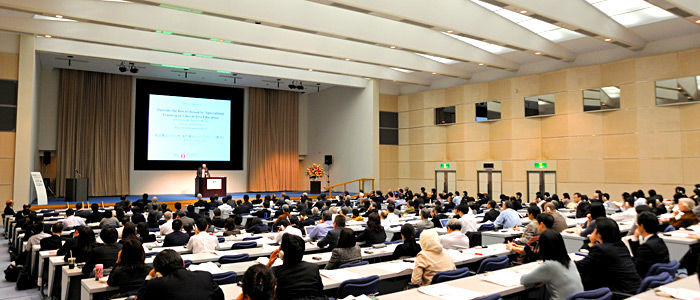
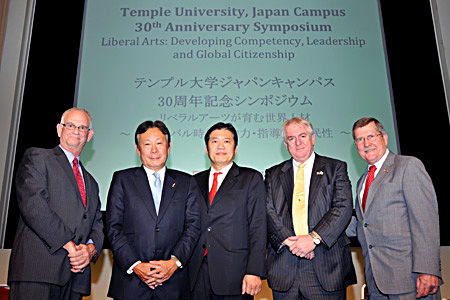
Presentation Summary
Presentation 1: "Outside the Box or Boxed In? Specialized Training or Liberal Arts Education"
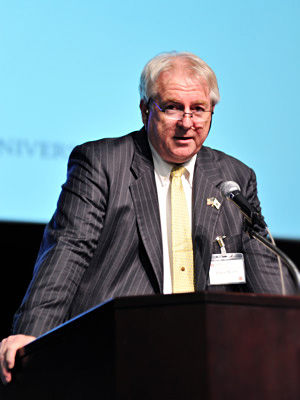
Ambassador Robert M. Orr [Profile]
Recently, the value of liberal arts education has been put into question. The governor of Florida, the state I am from, decided that liberal arts education is irrelevant to the 21th century and went so far as to suggest they reduce tuition for technical education courses and raise tuition for liberal arts courses at state universities. I do not agree with the governor. I am not saying we do not need technical or business education; we need both. Well-rounded, comprehensive education, including liberal arts, is important in order to get a good job and become a productive citizen.
In 2008, Duke University and Harvard University conducted a survey of leaders at 502 technology companies in the US. Only 37% had degrees in engineering or computer technologies. This suggests that it does require comprehensive, interdisciplinary learning experience in order to succeed.
Here is another example. When I was a high school student, I had an opportunity to interview a very famous quarterback in the American National Football league named Johnny Unitas of the Baltimore Colts. He was kind of like the Oh Sadaharu in football of his time. I asked his advice to high school football players and his answer was: "You shouldn't be playing only football. You should try basketball, baseball and other kinds of sports." Later I spent about 15 years in business at Motorola and Boeing where I conducted many hiring interviews. Often I found people with a degree in, say, English literature more attractive than those with straight business or technical degrees because they were more likely to be able to think outside the box.
A popular columnist in the U.S., Tom Friedman, wrote "Liberal arts education is more important than ever and it should be a top priority," because this is where innovation is born. A combination of arts, literature and hard sciences in technical areas gave birth to Apple's iPod and Google. In fact, Steve Jobs said that technology alone is not enough. It must be coupled with liberal arts or humanities. That is Apple's DNA and is "what makes our heart sing." If you study liberal arts, it develops curiosity and the ability to ask questions. It nurtures communication skills, creative thinking skills, the ability to make ethical judgments, and the ability to negotiate.
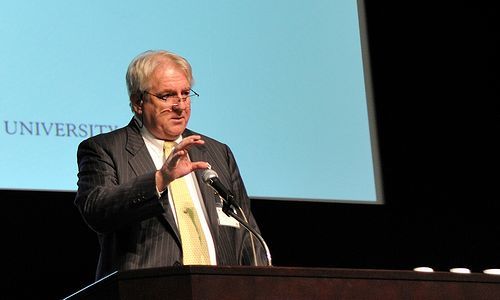
The Asian Development Bank has 67 member countries and we have a board representing 24 countries. In order to coordinate different interests among them, it is imperative to have solid understanding of what counterparts are thinking. In today's globalizing society, it is obvious that understanding of different cultures has utmost importance. This is provided by liberal arts education.
Presentation 2: "Major Deficiencies of Japan's Higher Education Institutions: From the Perspective of Beneficiaries"
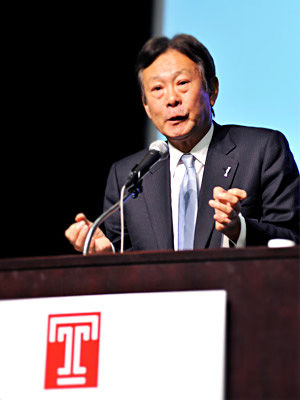
Dr. Yutaka Morohoshi [Profile]
1. Lack of mission
I worked as the first provost of Minnesota State University-Akita (now Akita International University) from 1989. Why did Minnesota State University create a campus in Japan? It did so because they had a need to internationalize the people of Minnesota, a state which was attempting to shift its economy from primary industry to the high tech industry. Its mission was to send students from the state universities to overseas and give them an international education.
Japanese universities, when we take a look at them, are lacking in mission. They are all the same. If individual universities were able to clearly set their missions, there would not be an excess of universities in Japan. The academic abilities of students may indeed have fallen as more high school graduates are getting admitted, but that does not necessarily equate to a decline in the quality of education at universities. On the contrary, the educational ability of the universities taking on such students should inevitably improve. But it does not seem to be the case, and this is due to the lack of mission at Japan's universities. Faculty members have to teach students who are not even capable of long division, and yet most of these teachers still think of themselves as researchers, and are hired based on their research track records. It is not clear whether such universities have primary focus on education or research.
2. Lack of administration
Japanese universities do not have professional administrators. Presidents are all amateurs in terms of university management. People who have worked as academics for many years are all of a sudden elected to the top of the university with no understanding of labor laws or how to read an asset ledger. With no experience in fundraising or lobbying, they are at a serious disadvantage in discussions with overseas university presidents.. This leaves the institutions in a very precarious state.
3. Lack of systems
American universities have all kinds of systems. For example, the grade-point average (GPA) is a verified system established through more than 100 years of tests in the U.S. Some Japanese universities have introduced the GPA, but in most cases it just substitutes A, B and C for the traditional Japanese scoring characters, without considering how they actually use the scores for any purpose. As soon as I became vice president of J.F. Oberlin University, I created a comments box on the university's homepage. The first comment that came in was from a student who pointed out the sloppiness of the way grades were evaluated. Introduction of the GPA should make students study very hard, and that is supposed to be the objective; however, many universities still evaluate grades without a clear set of standards.
In addition, being a professor at a Japanese university is a very unique vocation; people become teachers without learning about the job; how to teach. In recent years, universities have been gradually introducing peer observations, but evaluations of classes are not being undertaken in any meaningful way. It is true that class evaluations by students are not perfect, but a system must be created to evaluate whether teachers are truly communicating with students (not just fluency) and whether their passion for the class is felt by students. Yet many universities don't even have criteria for such evaluations.
Finally, turning to the issue of cost calculation, the concept of FTE (full-time equivalent) is non-existent at Japanese universities. Their accounting systems don't care how many credits a student actually takes per semester, as long as he/she pays the set tuition. Therefore, most universities are unable to give an answer to such a basic question: how much it costs for the institution to issue one credit.
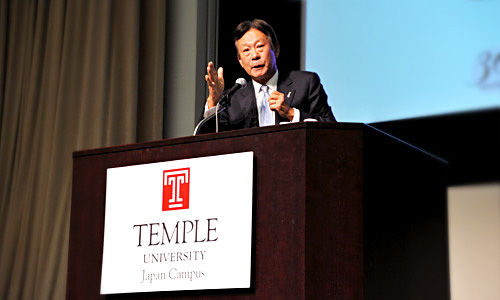
4. Importance of administrative staff
Administrative staff are partners of faculty, not their servants. Unfortunately, however, in Japan it is faculty who actually decide things, and administrative staff merely carry them out. In this circumstance, how do you expect to motivate staff? Training of staff is of utmost importance. You must be aware that there is no job title such as "administrative staff;" it is essential that each staff member becomes a specialist in areas such as counseling, career development, PR and academic advising. Hindrance to that is the traditional practice of position rotation based on lifetime employment.
5. Barriers between departments (gakubu/gakka)
For many freshmen at Japanese universities, the choice of their departments was reluctant; it is often the case that they couldn't get in any other because of their low test scores. Universities therefore have to work on the premise that such students naturally lack motivation. And this is where the liberal arts come in. Three years ago my own alma mater, International Christian University (ICU), abolished by-department admission and adopted a system whereby students learn a variety of liberal arts subjects for the first two years, and then select their majors in their third year. When I studied there, I had to choose from five departments (gakka) before entering; yet I changed my major three times after entrance. It is only liberal arts that can make this possible. Among those who took five to seven years to graduate, some wrote three theses. Those fellow students went on to graduate schools in the West, and are achieving success throughout the world in a whole range of fields such as law, pharmaceutical, science, business and engineering. I believe that liberal arts education provides the basis for everything in the world at large.
To this day I have never forgotten the words of an American professor at ICU when I was a freshman there in 1965. He said "Just remember this: The purpose of education is to reduce bias." As you receive education, you obtain knowledge that enables you to understand things. When you understand, fears melt away and biases disappear. In more than 47 years since, his words have remained in my mind and served me in all kinds of work. My career spans from a correctional institution in Canada, to organizing committees for the Olympic Games and soccer's World Cup, to university administration; I suppose I could describe myself as a typical product of the liberal arts. I am truly grateful to that professor. Liberal arts in Japan are starting to put forth their first buds, and I believe it is most certainly possible to blossom.
Presentation 3: "Leadership in the Global Era"
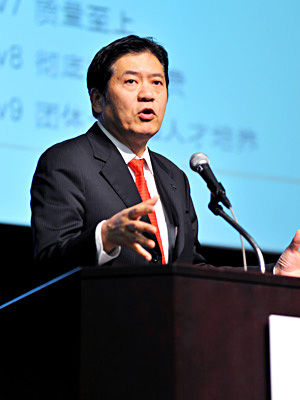
Mr. Yoshiaki Fujimori [Profile]
Japan has not needed to think seriously about globalization. Even at LIXIL, up until five years ago Japan made up 99% of our business. However, going forward all companies will have to go out into the world.
On leaving university I entered a trading company and did the job of a regular Japanese employee, but my turning point came when the company told me to go overseas to get an MBA. Back then I wanted to become the president of a Japanese company, so I felt at first that these two years would be a waste; however, that study abroad experience changed my whole view of the world. Five years after coming back to Japan, I was headhunted by General Electric (GE). Since I had entered an American company, I felt that I wanted to compete with Americans in their home country, so two years later I was allowed to go to America and have worked there ever since - for more than 20 years. During this period, the management philosophy of Jack Welch has made a major impact on me. As I reached the milestone of my 60th birthday, I felt that this time I would like to start a revolution in Japanese society, so I started working in my present position.
LIXIL is a group created one year ago. The group contains a variety of companies including Tostem, INAX and Sun Wave, all of which are No. 1 or No. 2 in the domestic market. However, they are not No. 1 or No. 2 in the world. Unless we expand to other countries, we cannot grow in the future. We demolished existing organizational structures to create a new one in order to improve our overall competitiveness, and have brought all this together into a single brand—LIXIL. We aim to become a global leader in the building materials and housing equipment industry within five years. We have set out an ambitious goal of increasing our overseas sales from 40 billion yen to 1 trillion yen. To do this, we are taking up the challenge of revolution—transforming our corporate culture into a global culture.
LIXIL's global management philosophy is based on five general principles. Globalization is not simply about increasing overseas sales or sending Japanese staff to a foreign country to sell lots of products there; it is about putting down roots in overseas locations, making use of local people, and becoming insiders. It is also about organizations which are diverse in every sense (gender, country, religion, language, etc.), coming together under a single ethos and value set, and moving together in the same direction. That is what I believe a global company to be.
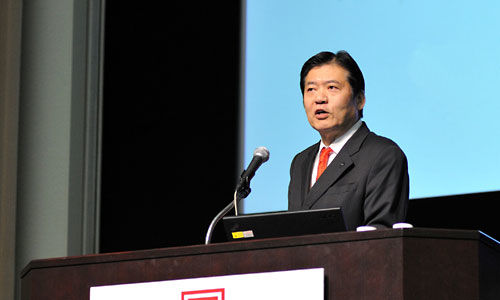
Currently, I feel that we lack sufficient global human resources. We have undertaken a number of buyouts and our overseas operations have greatly expanded, but employees at those acquired companies are all non-Japanese. If we are to motivate these people, it is crucial that we establish HR systems and leadership programs that will have currency worldwide. The Japanese people possess amazing ability to deliver, zeal, loyalty towards their companies and sense of responsibility; on the other hand they are not very good at taking action on their own initiative, expressing their thoughts openly and pursuing diversity. When people from a wide range of backgrounds come together, they appear at first glance to be completely uncoordinated, but their creative abilities and dynamic power when they are all moving in the same direction are amazing. It is important that we believe in this energy.
When you have various kinds of people, it is crucial that you have an equal ground for competition and a fair evaluation system. The criteria of such evaluation are leadership and the ability to deliver results—that is, meritocracy. When people possess both these abilities, we give them still higher targets and make them grow further. When one or the other is lacking, education is provided. When both are lacking we create a convection flow to the organization through a changeover, which leads to a new ground for competition.
In order to bring together an organization comprising such diversity, it is important to indicate clearly what the company's ethos and values are. It is the leader who embodies such values. We must explicitly define and evaluate leadership and ability to deliver results. The fairer such mechanisms are, the more we are able to foster human resources. At LIXIL we have set out "Nine Shared Values," of which I would like to discuss the following as being particularly important: "Change & Challenge," "Open & Transparent" (eliminating vertical and horizontal barriers), "Passion to Improve" and "Optimize Resources" ("choice" means throwing out 99 things out of 100).
The founding manager of GE once said "The essential thing for an organization to enjoy enduring growth is not an invention or a product, but people." That is why we emphasize investment in people and leadership training. However, people in their 40s who have had nothing except skill training in Japanese companies often have difficulties understanding the concept of leadership. At LIXIL, we first give them an opportunity to think about it through an eight-month initial training, and then based on that they are encouraged to set the direction of their next step. The important thing for developing leadership among the younger generation (in their 20s) is to have them go out and see the world. It is extremely important that they go out to places where people with all kinds of backgrounds come together.
Panel discussion
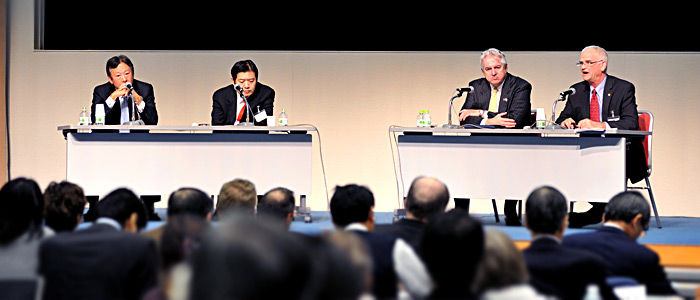
Bruce Stronach
Dean, Temple University, Japan Campus
Before we move on to the discussion, I would like us to think about what "the liberal arts" means. There is no universal definition of "the liberal arts." The reason is that the values of the liberal arts are determined by the time and place. The expression most commonly used in America is that the liberal arts is to produce "good citizens." In other words, this is about cultivating productive citizens in the economic and social sense. What is necessary in order to do this varies depending on the era and the place.
The liberal arts curriculum differs from what is called kyoyo kyoiku katei in Japan. It is highly structured and as an educational philosophy designed to deliver well-defined results. Leadership by administrators, not just professors, is essential in order to introduce such a curriculum.

Stronach
I would like to put two questions to the panel. First, regarding the discussion of whether there are too many universities, I think there are indeed too many. That said, I believe that we need to create new universities, while those universities whose role has ended should be disbanded; what do you think of this? I would also like to ask whether you think liberal arts education is truly necessary in Japan. What does "the liberal arts" ultimately mean in Japan? Diversification has not made progress in Japan; neither has internationalization, with the country still remaining relatively closed. Perhaps the liberal arts approach does not fit in easily with such a society?

Morohoshi
It is precisely because Japanese society is closed-off that the liberal arts are necessary. If we were more diversified, there would be no need for it to start with. Regarding the notion of universities being disbanded, once something has been created in Japan, scrapping it is no easy task. For example, the reason why Keio University created its Shonan Fujisawa Campus is because it could not do this at its existing faculties. A "scrap and build process" for Japan's universities would involve universities themselves issuing their own death sentences, so it would be impossible.

Fujimori
Introducing the liberal arts approach at the university stage is already too late. We need to nurture the ability to think more at the elementary, junior high and senior high school age in Japan. My children go to American schools, but the education is completely different from that in Japan. When you have a setup with too many universities, it is exactly the same as in the business world. Organizations grow weak but still struggle to survive. I think consolidation is essential. In business, if you continue consolidating companies and end up with just two strong ones left in the industry, this can bring forth dynamic power. For universities too, I think that rather than creating new universities or destroying weak ones, consolidation would be ideal.

Morohoshi
It is true that consolidation is essential, but bringing together two universities as one is difficult, and there are many cases where even the stronger universities become weaker as a result. Recently, we have started to form consortiums instead. Currently, we (J.F. Oberlin) are participating in a consortium which brings together 28 universities, called the Western Tokyo Universities Credit Exchange Consortium, and there is considerable traffic of students among us. Similar moves are afoot in Kobe and Kyoto. We are not yet at the point of eliminating inefficiency by joining together (such as reexamining redundant facilities). I believe this will be possible at the next stage, although it may be difficult due to government regulations.

Fujimori
It is the same with business enterprises; they are not attempting to consolidate, so they are losing out overall in the world. What Prof. Morohoshi just mentioned needs to be done more among companies as well.

Stronach
The opinion that universities and business are different is one that is heard in America as well; however, traditionally in America there have been a whole variety of partnerships between industry and academia. Yet in Japan the gulf between industry and academia is greater. If Japanese universities are to promote the liberal arts, they surely need to learn more from companies – for example, they need to take on the concept of "competition" – because one of the points of the liberal arts is to foster the ability to analyze things from a variety of perspectives. In addition, it is crucial that ways of thinking become more diverse in Japanese society which is not diversified in ethnic terms, and I believe that this is the significance of liberal arts in Japan. I would like, if I may, to pose a question. Is it true that all members of Japanese society need to hold a global perspective? Or is it true that society requires some members who do not do this? Furthermore, the image of the liberal arts is that they equate to elitism and are something for upper-class white people. Are liberal arts essential for everyone?

Orr
To have both a domestic and global viewpoint is not only possible but also necessary for everyone, since the communication revolution has drastically changed the world and there is no way back from this trend. President Obama was criticized by his opponents for being an elitist because he advocated university education for a broader population. That criticism is absurd because it essentially means lower income working class people do not need education. I think liberal arts education is for everyone. The GI Bill enacted in 1945 changed American education. Until then, university did mean Ivy League, but the Ivy League could not accommodate 12 million soldiers coming back from the war. The GI Bill propelled the equalization and expansion of university education throughout the U.S.

Morohoshi
Regarding the question of whether people can acquire a global mindset if they study the liberal arts, the reality is that some can do this and some cannot. I think I can say that the reason why I have lived in many different countries and had all kinds of options in my life to date is that I acquired a global mindset through my liberal arts education. However, there are many people who cannot think about anything except what is in front of them day by day, even if they were to receive the same education. The reality for the great majority of people is that there is no need to be conscious of other countries unless they themselves come into personal contact with them. If they were constantly thinking about the outside world, they would lose their ability to push their own country forward. I have never thought of the liberal arts as being about elitism. No matter what kind of person someone is, it is the liberal arts which can broaden their horizons (if they want to broaden them) and give them the tools to lead the kind of life they want.

Fujimori
Frankly, I do not think that there is much consciousness of the liberal arts and so on among companies. However, I think the liberal arts are surely important as tools that can be given to people to hone their leadership abilities.

Morohoshi
Looking at relations between companies and universities, in the 1960s the phrase "industry-university collaboration" was taboo on campuses; there was a feeling that people in academia should not talk to business people. It is only recently that such partnerships have begun to be promoted.
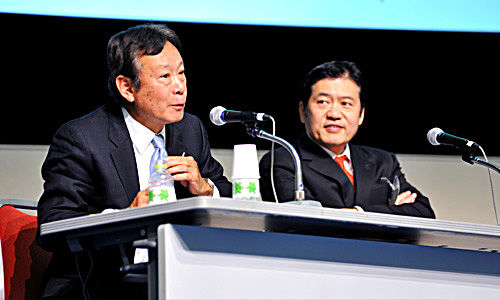

Fujimori
I think that industry-academia partnerships are stronger in America than in Japan. For example, GE has executives in charge of universities who deal with approximately 50 institutions in the U.S. In other words, they are involved at an executive level; they bring the CEO to these universities to give company presentations, etc. What is more, internships in Japan are a very strange setup; they are not utilized for hiring. In America, they are a traditional tool for recruiting. Japanese universities are still not linked up with the business world.

Morohoshi
At American universities, internship is done intensively throughout one semester (16 weeks), while in Japan it means just a worksite observation tour of two weeks at the most. Even if they sent students out to intern for longer periods, the way grades are evaluated is really sloppy. They are abdicating their responsibilities as universities. If that is the way they are doing this, it would be better to stop altogether.

Orr
A key to successful internships is the involvement of middle managers who actually receive the interns. Internships must be carefully designed and managers have the responsibility of overseeing the students. Unless middle managers are firmly committed, internships are a waste of time.

Fujimori
We need to create a system where companies admit more responsibility for receiving interns and pay them salaries. It is a pity that there is no proper internship framework even though students for their part have strong motivation and the ability to learn about society.

Morohoshi
It is very strange that we have the word shakaijin (member of society) as the opposite of "student." It is as though we think that students can assume no responsibilities until they head out into "society." Large numbers of students do part-time jobs at their own universities, but you cannot find them working in academic advising sections. Why? It's because universities do not allow them to work there since the job involves confidential information such as grades. It's a shame because giving them such responsibility would indeed provide true work experience for them.

Stronach
When I tried to bring in innovations at Yokohama City University, where I served as President, I encountered resistance. Many people responded to ideas for reform and change by saying "We do things in this way because we are a Japanese university." It seems that the attribute "Japanese" is a factor hindering innovation. It also implies that aspiring towards cultivating global citizens by introducing true liberal arts education is aiming to make universities "no longer Japanese." We need to rethink the definition of "Japanese," and this is something that applies not just to universities but to Japanese society as a whole.
QA
Questioner 1:
I want to raise my nine-year-old child as a global citizen. I want my child to receive a liberal arts education, but it was said previously that it is already too late by university age. Can I expect nothing from Japanese elementary, junior high and senior high school education? Do Japanese education and the liberal arts not go together well?

Fujimori
It is important to teach your child the habit of thinking, and foster the ability to think. I think it is better to start in elementary, junior high and senior high school, but if that is impossible then starting at university is better than never.

Morohoshi
Liberal arts education is expensive. At ICU, they have one professor for every 15 students. Meanwhile, there are universities with a 70:1 ratio. You cannot really educate at all like that. When you choose a university, you should carefully examine the quality of their education.

Stronach
There certainly is a problem with Japanese elementary, junior high and senior high school education, and that is the problem of entrance examinations. As long as there is the national center entrance exam, there will be no true liberal arts universities in Japan, since those test-taking students are not prepared to receive liberal arts education. Incidentally, I think that the Japanese custom of parents taking baths with their children is a wonderful opportunity for education. You can talk naturally about life, and this way children can learn a great deal. However, at the age children stop having baths with parents they start attending cram school, and become immersed in study for entrance examinations.
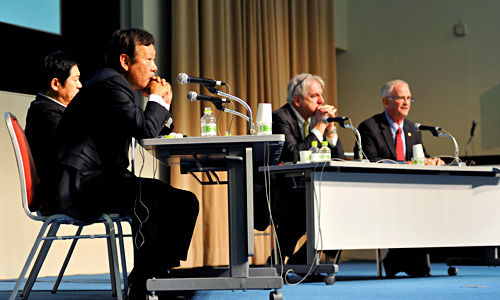
Questioner 2:
I understand the significance of liberal arts education, but the reality is that there is currently much need for specialist education and vocational training. What should we do to ensure universities teach more liberal arts curriculum?
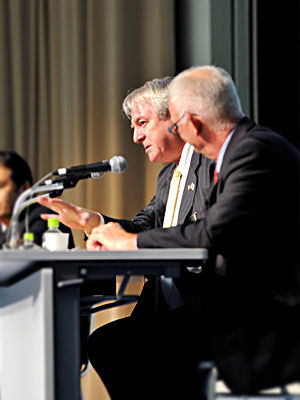

Stronach
The important thing is not "creating liberal arts courses." Rather, it is to use the liberal arts approach when teaching specialized subjects. This is not about the numbers of credits for liberal arts courses versus those for major requirements.

Morohoshi
Technically speaking, of the 124 credits (currently required to graduate) about 50 must come from the specialized subject, so the other 74 can come from elsewhere. So it should be possible to slightly rearrange curriculum and delay the major declaration. However, when student applications are recruited on a department-by-department basis, students are forced to choose their major from the first year. We need to get over these kinds of internal problems.

Orr
I think universities must have clearly defined liberal arts courses. I am appalled to see survey results that show young people do not have very basic knowledge of geography, history or philosophy. This is a fundamental issue which must be properly addressed by universities and they need to prioritize their resource allocations. It is no good to just make some minor adjustments to the existing curriculum to give it the appearance of the liberal arts.

Fujimori
I think that 80% of the elements necessary for liberal arts education are in place already, so it is for individual universities to decide how to arrange these and how to work on them.

Stronach
The composition of educational curricula is always a matter for discussion, because demands change along with the times. However, we need to avoid a dichotomy between the liberal arts education and specialized training. The liberal arts are fundamentally an undergraduate educational philosophy, and professional training is what you receive at a graduate school, hopefully at a different university. This understanding would make you realize that it is the liberal arts which will give all students what they need, regardless of the fields they progress to in the future.
